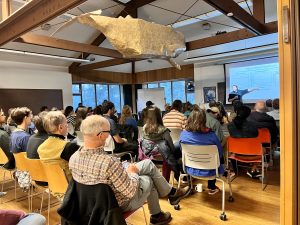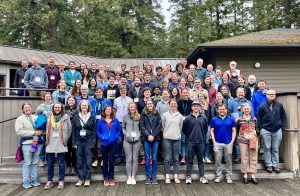Climate Change at the Poles: An Overview of the 2023 PCC Summer Institute
The Arctic has warmed four times faster than the lower latitudes over the historic record whereas warming and sea ice loss in polar regions of the Southern Hemisphere has been limited until very recent years. These hemispherically asymmetric trends in observed polar climate challenge our basic understanding of atmospheric, oceanic and cryospheric processes contributing to climate change and their representation in the climate models used to predict future climate change. Climate change in the polar regions has profound impacts on ocean biology, carbon uptake and the Indigenous communities of the Arctic. Additionally, polar climate change has global impacts on sea level rise through ice sheet melting, global energy balance, and remote impacts on atmospheric and oceanic circulations. Understanding “Climate Change at the Poles” as a testbed for our understanding of the climate system and uncertainties in future projections became the theme for the PCC’s annual Summer Institute.
The event, helmed by Aaron Donohoe (Principal Research Scientist at UW APL-Polar Science Center) was a chance for members of the PCC community to come together and share their work on the poles through presentation sessions, lightning talks, and posters. Promoting both science and engagement emerged as a clear goal during the planning process, resulting in the attendance of a variety of faculty and graduate students across many different institutions, researchers, Tribal members, and even a few undergraduates.
The SI itself was held over the course of three days, September 11-13th. Primed by several paper discussions over the past few weeks, attendees were already chatting about different aspects of polar change, even as they were still on the carpool from UW and riding the ferry across to San Juan Island. The weather at Friday Harbor Labs was pleasant, nicely contrasting the polar theme, and allowing for regular moments to enjoy the environment and the community. However, once attendees had settled in, people were ready for the sessions to begin.
Given the immense importance of centering Indigenous voices in this region, it was only fitting that the initial session on Monday focused on Policy and Indigenous Perspectives on Climate Change. Indigenous people of the Arctic are both the longest stewards of the region and the peoples most severely impacted by Arctic change, and it is vital that they are included in this work. Thus, each presenter emphasized the importance of including Indigenous knowledge, whether in driving future climate science, fishery and marine adaptation, or Arctic policy. This session featured several young Indigenous researchers who emphasized that the research community has to move beyond the notion of reconciling the contrast between scientific and Indigenous knowledge. Rather, the speakers emphasized that future progress in Arctic research will require co-production of knowledge with both the Indigenous and academic communities each playing important roles in advancing climate science, justice, and action.
On Tuesday morning, the discussion shifted towards Sea Ice and Polar Observations, one of the most critical aspects of the changing Arctic. Topics included everything from Arctic Ocean circulation change to modern-day polar sea ice observations to wave-ice feedbacks to phytoplankton responses. The diversity in subject and application of this research made the session a highlight of the event.

Following time to explore San Juan Island, Tuesday evening’s session was on a Climate Dynamics Perspective of Polar Amplification, looking at the science behind why climate change processes and impacts are exacerbated in polar regions. Presenters discussed the dynamics leading to enhanced warming in the Arctic compared to the Southern Ocean, as well as the various roles of internal variability on and climate forcing on Arctic amplification. It is critical to understand how and why these changes are occurring to protect the poles themself and to predict changes to other regions in the future.
The final session, on Wednesday morning, focused on one of the most iconic aspects of climate science: the Ice Sheets. Both Greenland’s and Antarctica’s ice sheets were discussed in-depth, with talks on interannual variability, ice velocity, climate forcing, and ice-ocean interactions. The emphasis on the driving factors and impacts associated with this issue was perhaps the most fitting ending possible to a polar-themed Summer Institute.
While the SI itself ended on Wednesday, the interest and emphasis on polar regions remains a subject of eternal research and discussion for climate scientists. The importance of the poles can not be understated. They serve as a vital force in regulating climate conditions, a bellwether for future change at lower latitudes, and a source of support for a variety of unique organisms, ecosystems, and cultures. With climate change disproportionately threatening these regions at ever-faster paces, it is critical that continued interdisciplinary research, modeling, and action is promoted, including a variety of interdisciplinary and non-Western perspectives. Such is the value in the PCC Summer Institute: being able to bring so many diverse scientists and stakeholders together into a forum to drive polar science and adaptation, with specializations in everything from biology to physics to policy to filmmaking. With the inclusion of all of these voices, we are one step further along the path towards understanding and preserving these fragile systems.
Talks and discussions followed four themes:
“Policy and Indigenous Perspectives on Climate Change,” speakers Nadine Fabbi (UW Jackson School), Kimberly Kivvaq Pikok (University of Alaska Fairbanks), Lloyd Pikok Jr. (UIC Science)
“Sea Ice and Polar Observations,” speakers Jamie Morison (UW APL-Polar Science Center), Melinda Webster (UW APL-Polar Science Center), Edward Blanchard-Wrigglesworth (UW Atmospheric Sciences), Jim Thomson (UW APL and Civil and Environmental Engineering), Channing Prend (UW Oceanography), Jodi Young (UW Oceanography)
“Climate Dynamics Perspective of Polar Amplification,” speakers Kyle Armour (UW Atmospheric Sciences/Oceanography) and Lily Hahn (UW Atmospheric Sciences and Scripps Institute of Oceanography), Mark England (University of Exeter), Cecilia Bitz (UW Atmospheric Sciences)
“Ice Sheets,” speakers Ben Smith (UW APL/ESS), Michalea King (UW APL-Polar Science Center), Eric Steig (UW ESS), Susheel Adusumilli (UC San Diego), Karen Alley (University of Manitoba)
Visit the 2023 Summer Institute event page on our website for more detail.
Thanks to all our speakers and participants for contributing to a week of interesting talks and discussions!

By Isaac Olson (UW PCC Undergraduate Assistant) and Aaron Donohoe (Principal Research Scientist at UW APL-Polar Science Center)